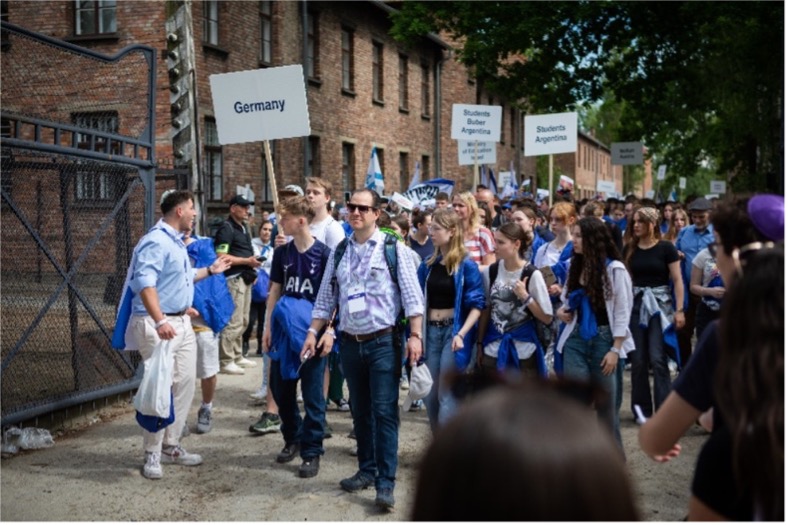
Phillip Doczi Chairman of March of Remembrance and Hope in Austria at the March of the Living (Photo Credit: Chris Wisser)
March of Remembrance and Hope – Austria is a non-profit organization, founded in 2005, providing “MoRaH” Holocaust educational programming for predominantly non-Jewish Austrian students. Every spring, MoRaH brings one of the largest delegations of students to participate in the annual March of the Living from Auschwitz to Birkenau on Holocaust Remembrance Day. Since its inception, approximately 12,000 Austrian students have participated in program.
INTERVIEW: PHILIPP DOCZI, CHAIRMAN OF MARCH OF REMEMBRANCE AND HOPE – AUSTRIA
What year was the March founded in Vienna? And, what was the motivation?
The program was founded by Roni Shlomovitz in 2005. He organized the first trip which was very small with mostly non-Jews. I think it was about 100 people from two high schools. Then the next year, it was like 200, and then 250, and then 300. For 2025, we have applications from 1,111 high school students from non-Jewish Austrian schools all over the country.
We are also working together with the Jewish Youth Department of the Jewish community in Austria. They are having a program called Likrat, where they organize meetings between Jewish youngsters and are going to non-Jewish schools and talk about Judaism and talk about how we’re all the same, just we have different beliefs, but let’s talk about it. Because in Austria, most Austrian people have never met a Jew. I’m meeting teachers when I’m doing my workshops, and that’s the first time they ever have met a Jew.
We have a so small Jewish community in all of Austria, we have I think officially 8,000 registered members out of a population of about 9 million. We are probably the only Jewish organization in Europe that does what we are doing. Bringing together authentic Jewish life to non-Jewish schools and together traveling to Auschwitz to show them all about the atrocities there and bringing them back home again and have aftermath programming as well.
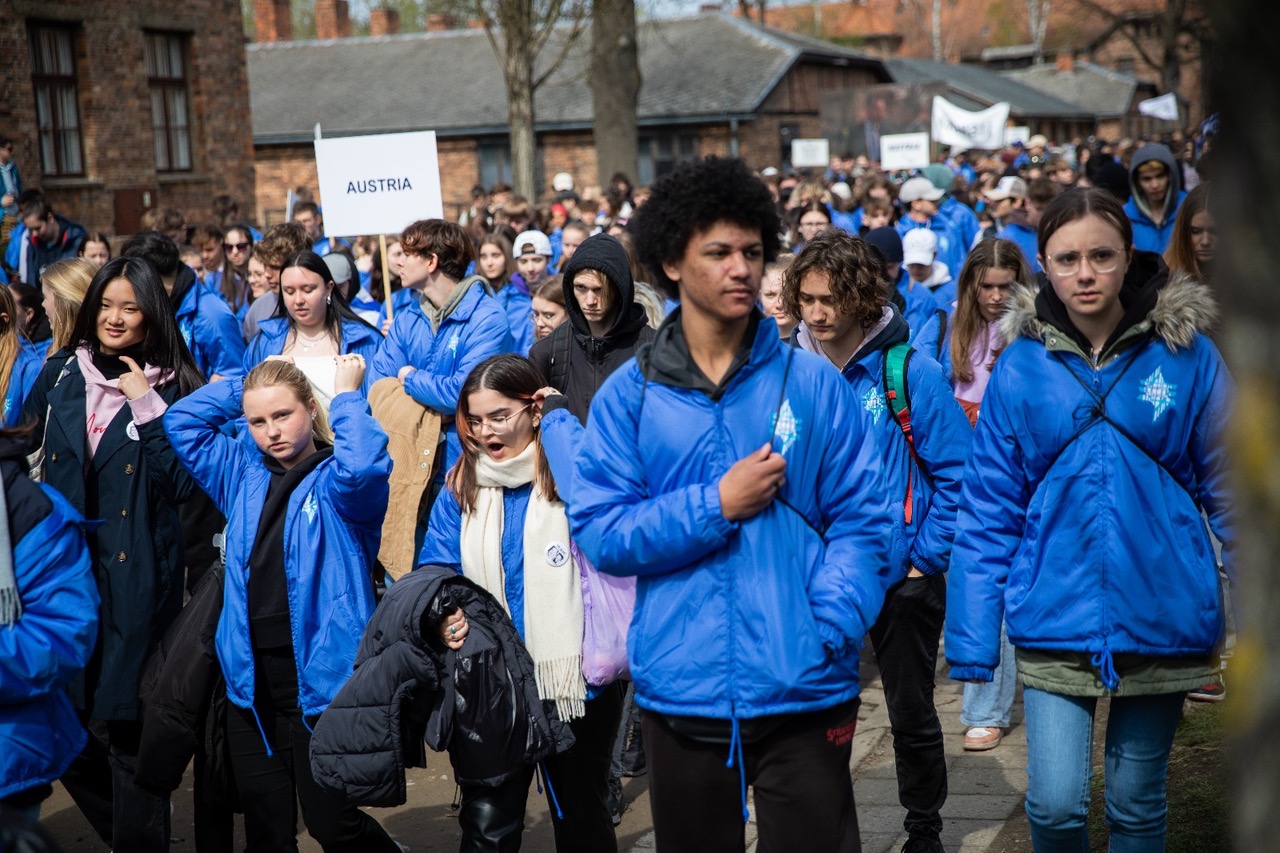
Students from the Austrian delegation to the March of the Living (Photo Credit: Chris Wisser)
On the March we take the kids back into history. On the journey to Auschwitz we show them what happens if you diminish minorities, if you do what the Nazis did. We always have a survivor with us.
Over the past years, it was Marko Feingold. He passed away two or three years ago. He was the head of the Jewish community in Salzburg. He was 106 years old in the end. And he was with us until his 104th birthday. Amazing guy. During the war, he was in Auschwitz with his brother, and he survived Auschwitz, and I think four other camps. And he told the story to the students. Marko was from Austria and he spoke with the students as if they were his grandchildren. He talked to them about being a father, about how difficult it was for parents with their children – being separated.
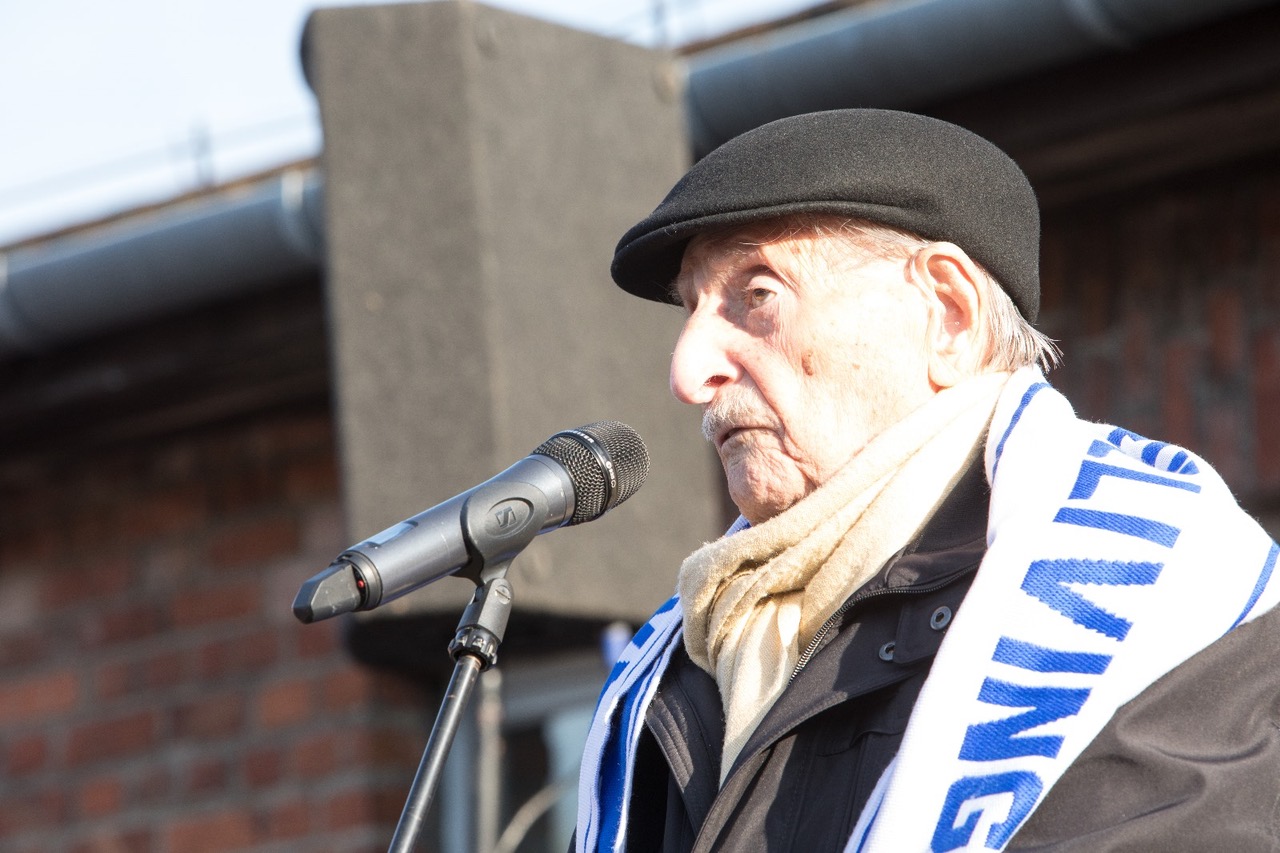
Holocaust Survivor Marko Feingold speaking at the March of the Living (Photo Credit: Chris Wisser)
If you want to reach the kids, you don’t show them sheer numbers. A number is always theoretical. You must tell them stories of children and stories they can relate to. 12 years ago we traveled with Mr. Mandelbaum. He was within those special units – the Sonderkommando. He had to pick out the dead bodies from the gas chambers and put them inside the crematoria. His stories were devastating. And the students – all of them were crying. And it’s not because he tried to make them cry. it just came out. He was an old man telling them his story and telling the sadness of his journey and everything. It was an amazing experience.
The message of the survivors to the students is learn from history. Do not make the same mistakes. Be open-minded and open your eyes to see and to not turn away and just leave it to others. Be an active part of society. Encourage civil courage.
It is also important to us to show the students today’s Jewish life. After the March we are having a big concert at the main synagogue in Krakow, the Tempel synagogue, with the Chief Cantor from Vienna, Shmuel Barzilai. And yes, it’s wonderful. It’s like Simchat Torah, because we’re celebrating there, we’re singing together, we’re giving them a positive view of the future.
The feedback we get from teachers and especially from parents, they tell us, when we send our children with you, we sent them away as kids. And when they came back, they were adults. That’s powerful.
Speaking on the importance of the program as an experiential journey Phillip says that “Holocaust education in Austria start at the age of 14. And then at the age of 17, they have sets about the history in Austria and the National Socialist Party and the rise of Nazism. It’s not mandatory, but most of the high school students go to the Austrian concentration camp of Mauthausen.”
Speaking about the importance of visits to Auschwitz, Phillip said:
“In school, even when it comes to the Shoah, it’s often just numbers – it’s just pictures. But if you’re there and if you see the atrocities, the hair and the shoes and everything, and you hear the stories of people who really experienced this – that’s amazing, that’s impactful.”
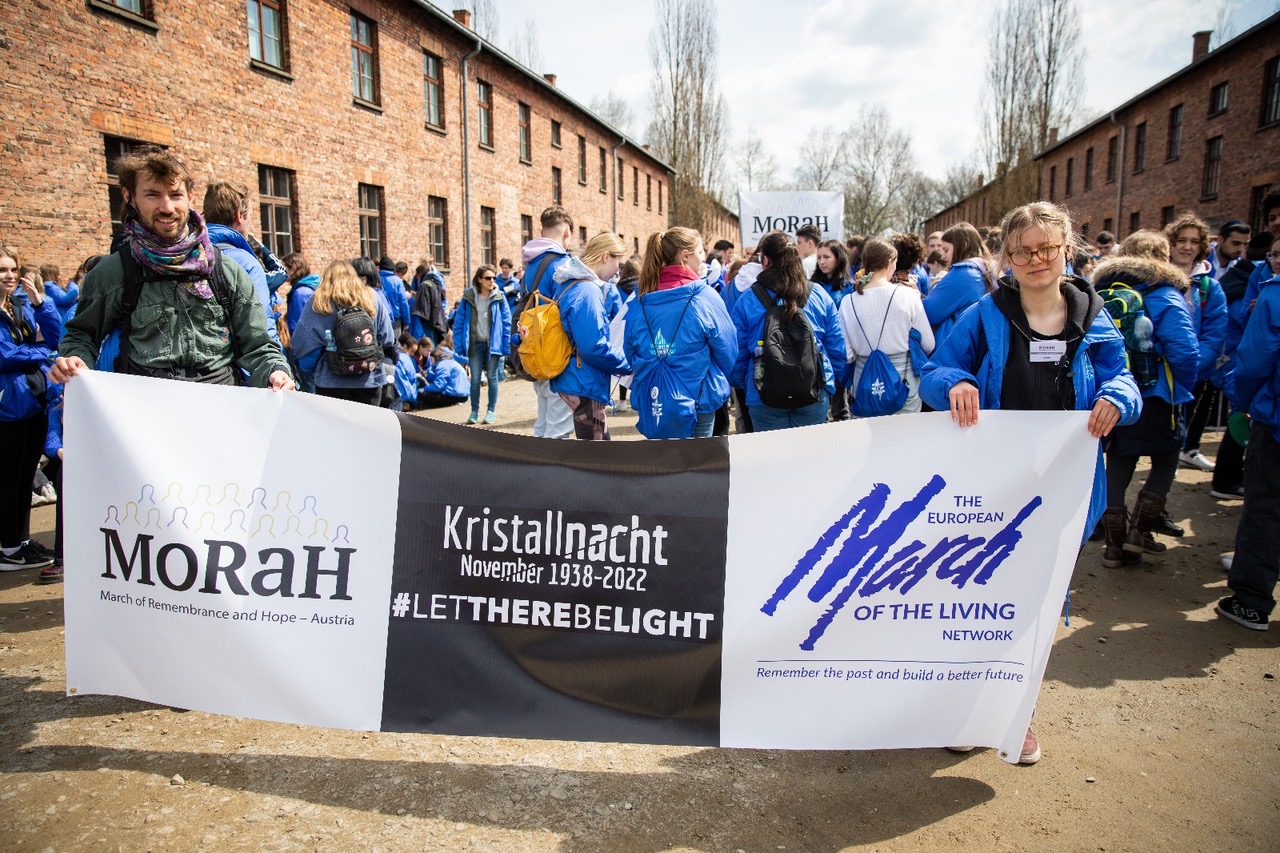
Austrian students at the March of the Living (Photo Credit: Chris Wisser)
Are there warning signs in Austrian society today in terms of antisemitism or racism or things that concern you, so that you want to make sure this program continues?
Like everywhere else in Europe at the moment we are in between the extremists on all sides who are getting stronger. It used to be the far right, but in Austria, after the war, 90% of Austrian society knew we don’t want that again. So, it was not a real threat to the Jewish community – that was done with at the end of the Nazi empire.
And until I think the 7th of October, we thought everything was okay. We have our friends we can rely on. And after the 7th of October, we found out – no, there are big parts of those so-called friends, especially from the very far left side, that we thought of as friends, but actually they are not. And because of this very left extreme movement and of these leftist extreme views, the far right rises again. And both are extremely dangerous to our society.
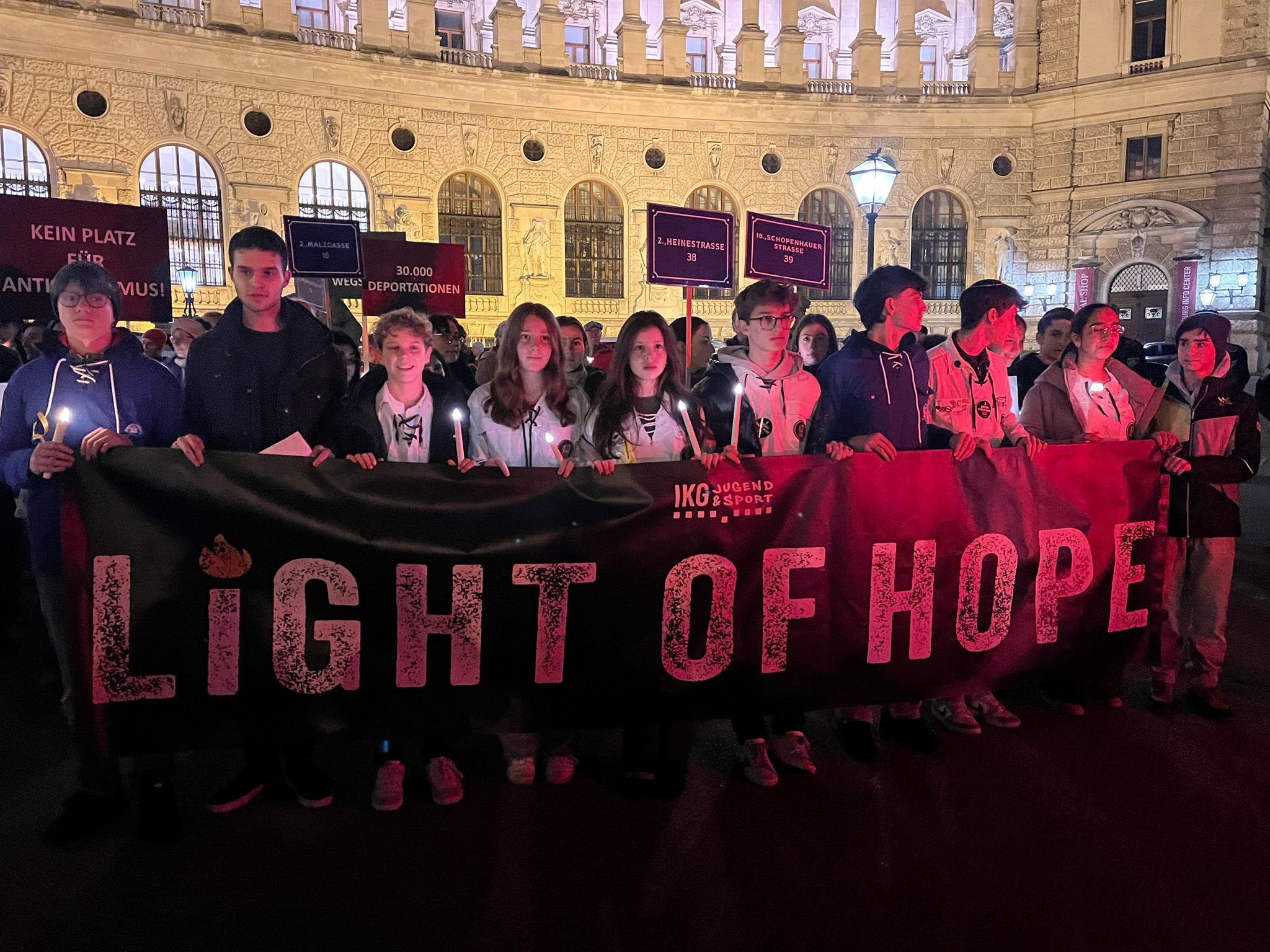
March of Light and Hope 2024 (Photo Credit: Phillip Doczi)
How do you commemorate Kristallnacht?
Every year, we have the March Light of Hope. In 2016 we had some 800 participants and over the course of years, it grew to over 2000 participants. It takes place within the Vienna inner city, starting at the Heldenplatz ending at the Judenplatz, where there is a big ceremony, organized by the Jewish youth of Austria.
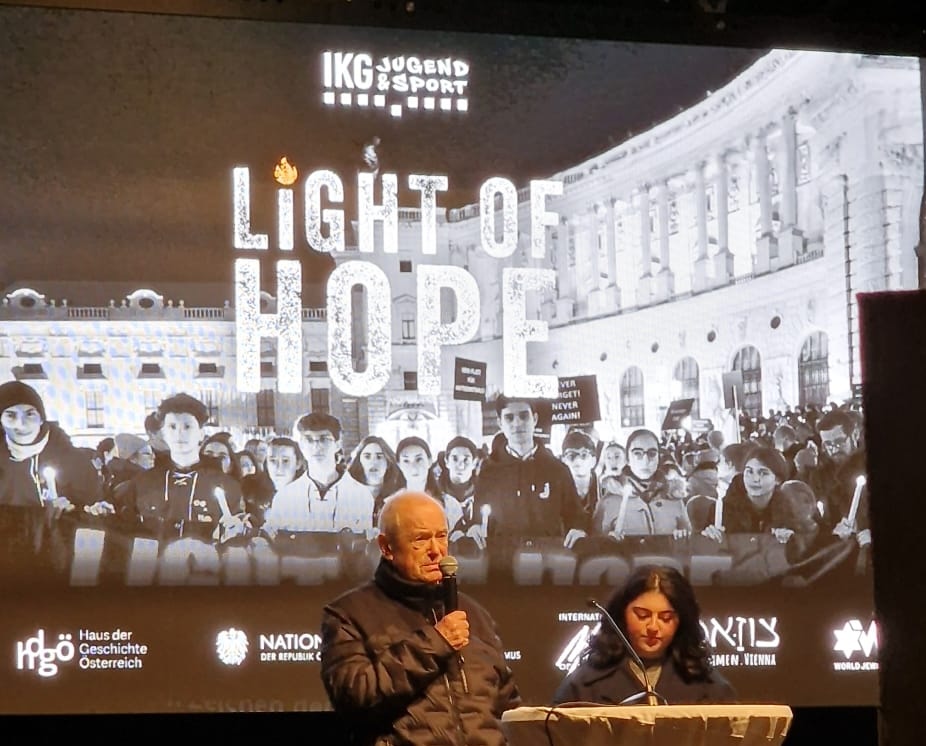
Holocaust Survivor Gerhard Pollak at the March of Light and Hope 2024 (Photo Credit: Chris Wisser)
This year a 98 year old survivor will speak: Mr. Pollak from Czech Republic. But apart from that, it’s completely done by the youth of Austria, by the Jewish youth – no politicians and adults speaking except for a survivor.
And that’s a good thing, right?
From an educational perspective, it’s amazing because it’s empowerment for the youth. Because they are the future. They are the ones who should do it. And not old people telling them to be like this or that – it has to come from within. And we can motivate them. And it works because they’re super active.
We are official partners along with the March of the Living. But it’s moral support. And we are promoting the event to our schools and to the schoolkids trying to motivate school classes to come together and to commemorate together. Every year we have some 200 school kids from the March of Remembrance and Hope attending this event.
From your personal perspective, why are you so involved in the program? What gives you the motivation every single day to get up and make sure this program keeps going?
Well, I think if we are happy about what societies we live in today – it’s because it’s a democratic society. It’s an open-minded society. It’s a tolerant socie ty. We have to make sure that it stays that way. And I think there’s no better way than to have the example of the Shoah, to show where the journey can go if you are not aware of structures and evil thoughts. I think that’s the core value of teaching. If you want to keep democracy alive, you have to make sure that the next generations know what democracy is about and where the wrong road view can lead to. That’s the broader view, the broader goal of the program.
What gives you hope for the future?
Well, maybe it’s the youngsters. It’s always the new generations, the younger generations. And I think, well, everyone wants to live a pleasant life. No one wants turmoil, no one wants revolution and bad things to happen. And I think every new generation is, in some respect, innocent. And with this innocence, they are longing for the best, for a secure and peaceful future. And as you can see, wars are done by old men. So I hope for the young generation to learn from the history we show them, and to be better, to be better than these old generations who are still in this struggle, with all this violence and hate speech and so on.
Interview conducted by Eli Rubenstein, Director of Education, International March of the Living








